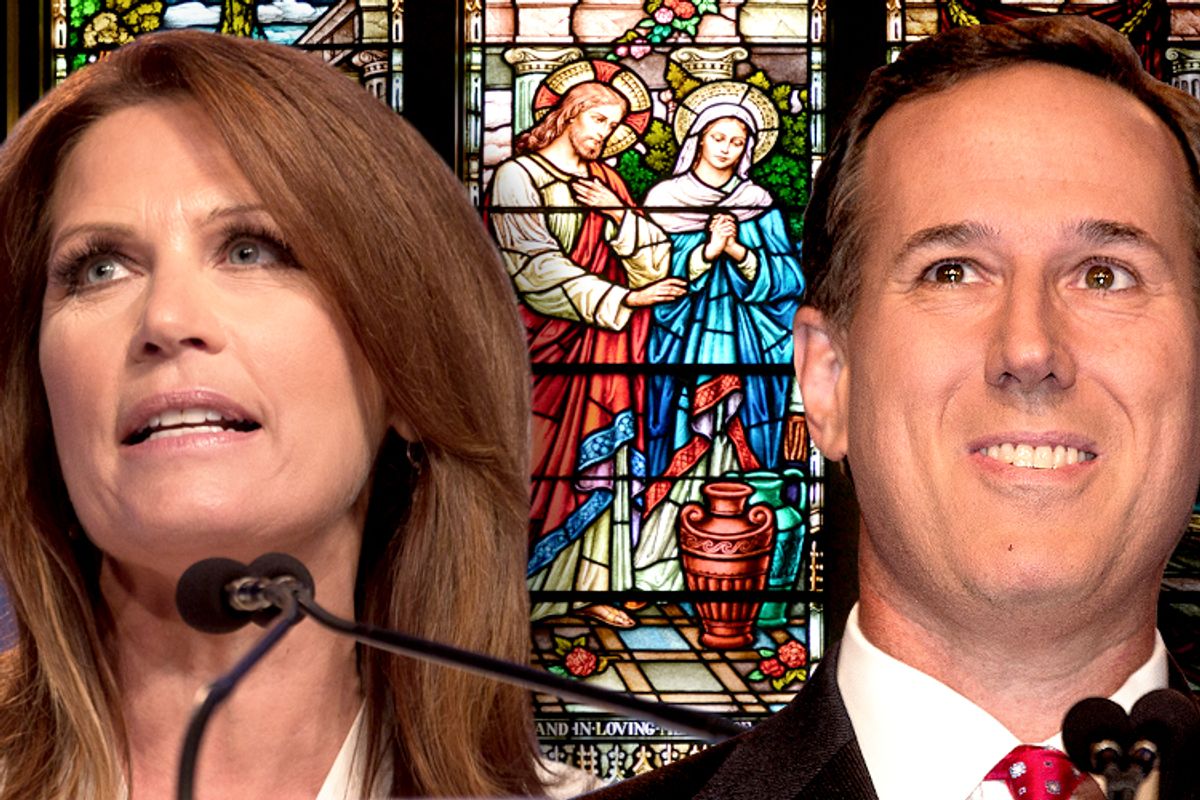Judging from conservative reactions, Arizona Governor Jan Brewer installed a fascist tyranny in her state this week by vetoing a bill that permitted businesses to engage in anti-gay discrimination. If they are to be believed, conservatives who favored the bill did so out of a concern for the religious and individual freedom of vendors.
Historically, this has been a common last-ditch defensive posture for political factions that have lost their fight to deny others existential equality, whether on the basis of gender, race, sexuality or otherwise. First, they fight against existential equality outright, by limiting, for instance, equal access to schools for women, equal access to hotels for blacks, or equal marriage rights for gays. Second, once they’ve lost that battle, they try to defend pockets of discriminatory exclusion on some comical grounds that really it is the bigot whose rights are being trampled.
These arguments are generally disingenuous, but let us assume for a second that conservatives are serious about this. Let us say that people like Tim Carney, Ben Shapiro and Rich Lowry seriously believed that individuals should be able to exempt themselves from economic laws if they have religious objections to those laws. What kinds of things might that actually entail?
Well, we know for instance that apparently it entails the ability to establish discriminatory businesses. It also entails the ability to establish universities that forbid blacks or interracial couples, as Bob Jones University once did for purportedly biblical reasons. Since these business entities have religious objections to anti-discrimination laws, they should be exempt from them, conservatives claim.
But if this is true, then one has to wonder: Why can’t there be religious exemptions from other economic laws, for instance property law? If someone has a genuine religious belief that the world belongs to everyone or to God and that private property is contrary to their religion, wouldn’t it be an injustice to impose it upon them?
This is not a totally hypothetical question. There are Christians (especially in prior historical eras) who believe that God made the earth and gave it to humankind in common, and that private enclosure of things like land is contrary to God’s will.
Although he unsuccessfully argues against the view that this makes private property impossible, you can even see famous property rights theorist John Locke concede it in his "Second Treatise." Locke states in the very first paragraph of his chapter on property that “it is very clear that God, as king David says, has given the earth to the children of men; given it to mankind in common.” He mentions this fact two other times and includes animals for good measure, stating “the earth, and all inferior creatures, [are] common to all men.”
In stating that God has given the earth to all men in common, Locke relies upon Psalm 115:16, which states “The highest heavens belong to the Lord, but the earth he has given to mankind.” He also is clearly relying on Genesis 1:28, in which God is reported to say “Be fruitful and increase in number; fill the earth and subdue it. Rule over the fish in the sea and the birds in the sky and over every living creature that moves on the ground.”
Pierre-Joseph Proudhon read the same biblical passages and came to the same conclusion as Locke, namely that God gave the earth to mankind collectively. Unlike Locke, though, he interprets these passages, along with other considerations, as generating the famous conclusion that “Property is theft!”
After quoting an author who cites these and other biblical passage, Proudhon notes: “God gave the earth to the human race: why then have I received none? He has put all things under my feet, — and I have not where to lay my head!” Later, Proudhon notes that property owners capture land rents (as Ricardo famously discussed) and claims that this is also improper under his religious understanding of the origin of the earth: “Who is entitled to the rent of the land? The producer of the land, without doubt. Who made the land? God. Then, proprietor, retire!”
It is these considerations and others that have motivated a number of Christian socialists and anti-propertarians to declare private property to be contrary to the dictates of their religion. Accordingly, out of concern for their religious liberty, it seems only fair that we exempt such individuals from property laws. Who is the tyrannical state to invent and violently impose a system of property ownership on those who have religious objections to it? Who is the state to force a religious person to act contrary to their conscience and deeply held beliefs?
Ultimately, my point here is that our discussion of religious liberty in the economic sphere is oddly narrow. You’ll notice that conservative defenders of religious exemptions to economic laws assume in the background a basic set of inviolable capitalist institutions: property, contract, and so on. It is of course those institutions that even make it possible for discriminatory exclusions to take place in the first place (on what basis do you kick a gay person out of a restaurant in a world without property law?). But you can generate religious objections all the way to the core of our government-imposed economic system. There are religious objections to property itself! For conservatives, those kinds of objections don’t permit opt-outs from economic laws, though, only objections of the sort that wish to deny existential equality to gay and black people. I wonder why.

Shares